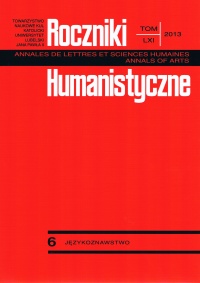Two Indo-European Verbal Roots Denoting ‘To Pick, Gather, Collect’
Abstract
There are two verbal roots *sleĝ- (not *leĝ-) and *les- denoting ‘to pick, gather, collect’ in the Indo-European languages. The former root is attested in the central group of the Indo-European languages (Albanian, Greek, Indic, Italic), the latter one represents an Anatolian-Baltic-Germanic isogloss of archaic origin. The root *leĝ- (included in most dictionaries and monographs) should be correctly reconstructed as *sleĝ-. The initial cluster is confirmed by the Albanian phoneme l representing an earlier geminate (Alb. l < Proto-Albanian *ll < IE. *sl), as well as by the Old Indic deverbal form, cf. Sanskrit sraj- f. ‘garland, wreath’, originally ‘collection (of flowers)’ = Lat. lex, legis f. ‘law’, orig. ‘collection (of legal rules, principles)’ (< IE. *sleĝs f. ‘gathering, collection’).
The internal evidence taken from the Greek data is noteworthy. Firstly, Aeolic ἐπίλλογος (= Attic-Ionic ἐπίλογος) contains the geminate -λλ-, which can be hardly explained, if the word in question derives from IE. *epi-loĝos. This is why we must suggest the Indo-European archetype *epi-sloĝos, as well as the verbal root *sleĝ-. Secondly, the perfect verbal form εἴλοχα seems to derive regularly from the reduplicated archetype *se-sloĝ-h2e, which points exclusively to IE. *sleĝ- and not to the suggested verb *leĝ-. Thirdly, Doric ἀμφιλλέγω ‘to dispute about, to dispute, to question’ (= Attic ἀμφιλέγω) seems to document a derivation from IE. *ambhi-sleĝō.
The verbal root *les-, attested in Anatolian (cf. Hittite lešš- ‘to pick, gather’), Baltic (cf. Lithuanian lèsti ‘to pick up’) and Germanic (cf. Gothic lisan ‘to pick, gather’), should be treated as primitive and Proto-Indo-European (Indo-Hittite). The extended root *sleĝ- (orig. *ls-e-ĝ-) represents an innovation, being derived from the root *les- by means of the verbal suffix -ĝ-. The observed metathesis of initial cluster (*sl- < *ls- < *les- ‘to pick, gather, collect’) is acceptable.
References
Abramowiczówna Z. (red.): Słownik grecko-polski, t. II, Warszawa 1962.
Aloni A.: La lingua dei greci, Roma 2004.
Beekes R.: Etymological Dictionary of Greek, vol. I-II, Leiden-Boston 2010.
Benveniste É.: Origines de la formation des noms en indo-européen, Paris 1935.
Boisacq É.: Dictionnaire étymologique de la langue grecque étudiée dans ses rapports avec les autres langues indo-européennes, Heidelberg-Paris 1916.
Buck C. D.: A Dictionary of Selected Synonyms in the Principal Indo-European Languages, Chicago 1949.
Chantraine P.: Dictionnaire étymologique de la langue grecque. Histoire des mots, t. III, Paris 1974.
Clackson J.: Indo-European Linguistics. An Introduction, New York 2007.
Dercksen R.: Etymological Dictionary of the Slavic Inherited Lexicon, Leiden-Boston 2008.
ErnoutA., Meillet A.: Dictionnaire étymologique de la langue latine. Histoire des mots, 3e éd., Paris 1951.
Fraenkel E.: Litauisches etymologisches Wörterbuch, Heidelberg-Göttingen 1962.
Frisk H.: Griechisches etymologisches Wörterbuch, Bd. II, Heidelberg 1962.
Hirt H.: Etymologie der neuhochdeutschen Sprache, München 1909.
Hofmann J. B.: Etymologisches Wörterbuch des Griechischen, München 1950.
Jurewicz O.: Gramatyka historyczna języka greckiego, Warszawa 1999.
Kaczyńska E.: Perfect Forms of the Verb λέγω, „Eos” 98(2011), s. 241-246.
Kaczyńska E.: The Indo-European Origin of Latin lex, „Habis” 44(2013), s. 7-14.
Kloekhorst A.: Etymological Dictionary of the Hittite Inherited Lexicon, Leiden-Boston 2008.
Kłyczkow G. S.: Teoria rozwoju języka i językoznawstwo historyczno-porównawcze, Warszawa 1975.
Lehmann W. P.: A Gothic Etymological Dictionary, Leiden 1986.
Lehmann W. P.: La linguistica indoeuropea, Bologna 1999.
Liddell H. G., Scott R.: A Greek-English Lexicon, With a Revised Supplement, Oxford 1996.
Mallory J. P., Adams D. Q.: Encyclopedia of Indo-European Culture, London-Chicago 1997.
Mallory J. P., Adams D. Q.: The Oxford Introduction to Proto-Indo-European and the Proto-Indo-European World, Oxford 2006.
Matasovic R.: Etymological Dictionary of Proto-Celtic, Leiden-Boston 2009.
Mayrhofer M.: Kurzgefasstes etymologisches Wörterbuch des Altindischen, Bd. III, Heidelberg 1964.
Mayrhofer M.: Etymologisches Wörterbuch des Altindoarischen, Bd. II, Heidelberg 1996.
Meillet A.: Wstęp do językoznawstwa indoeuropejskiego, Warszawa 1958.
Monier-Williams M.:A Sanskrit-English Dictionary, Delhi 1999.
Montanari F.: Vocabolario della lingua greca, Milano 2003.
Muller F.: Altitalisches Wörterbuch, Göttingen 1926.
Orel V. E.: Albanian Etymological Dictionary, Leiden-Boston-Köln 1998.
Orel V.: A Handbook of Germanic Etymology, Leiden-Boston 2003.
Otrębski J.: Gramatyka języka litewskiego, t. II, Warszawa 1965.
Plezia M. (red.): Słownik łacińsko-polski, t. III, Warszawa 1998.
Pokorny J.: Indogermanisches etymologisches Wörterbuch, Bern-München 1959.
Puhvel J.: Hittite Etymological Dictionary, vol. V, Berlin-New York 2001.
Расторгуева В. С., Эдельман Д. И.: Этимологический словарь иранских языков, т. I, Москва 2000.
Rix H. (Hrsg.): Lexikon der indogermanischen Verben. Die Wurzeln und ihre Primärstammbildungen, 2. Aufl, Wiesbaden 2001.
Roberts E. A., Pastor B.: Diccionario etimológico indoeuropeo de la lengua española, Madrid 1996.
Rodríguez Somolinos H.: El léxico de los poetas lesbios, Madrid 1998. Schumacher S.: Die keltischen Primärverben, Innsbruck 2004;
Smoczyński W.: Słownik etymologiczny języka litewskiego, Wilno 2007.
Sihler A. L.: New Comparative Grammar of Greek and Latin, New York-Oxford 1995.
Szemerényi O.: Introduzione alia linguistica indoeuropea, Milano 1985.
Trautmann R.: Baltisch-Slavisches Wörterbuch, Göttingen 1923.
Untermann J.: Wörterbuch des Oskisch-Umbrischen, Heidelberg 2000.
De Vaan M.: Etymological Dictionary of Latin and the other Italic Languages, Leiden- Boston 2008.
Walde A.: Lateinisches etymologisches Wörterbuch, Heidelberg 1910.
Walde A., Hoffmann J. B.: Lateinisches etymologisches Wörterbuch, 3. neubearbeitete Auflage, Bd. I, Heidelberg 1938.
Walde A., Pokorny J.: Vergleichendes Wörterbuch der indogermanischen Sprachen, Bd. II, Berlin-Leipzig 1926.
Watkins C.: Indo-European and the Indo-Europeans, w: W. Morris (ed.), The American Dictionary of the English Language, Boston-New York-Atlanta-Geneva-Dallas-Palo Alto 1970, s. 1496-1550.
Weiss M.: Outline of the Historical and Comparative Grammar of Latin, Ann Arbor-New York 2009.
Weiss M. L.: Studies in Italic Nominal Morphology, A Dissertation Presented to the Faculty of the Graduate School of Cornell University. UMI, MI 48106, Ann Arbor 1993.
Witczak K. T.: The Latin Origin of the River name Tiberis, „Latomus” 72(2013).
Copyright (c) 2013 Roczniki Humanistyczne

This work is licensed under a Creative Commons Attribution-NonCommercial-NoDerivatives 4.0 International License.





